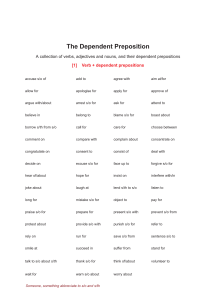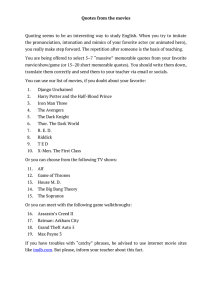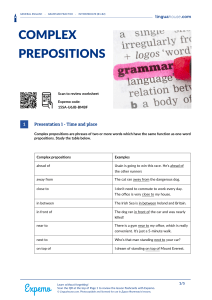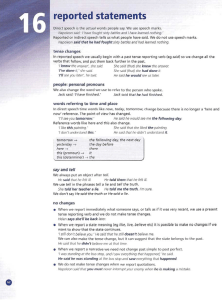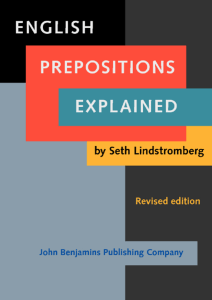Уж чего-чего, а
advertisement
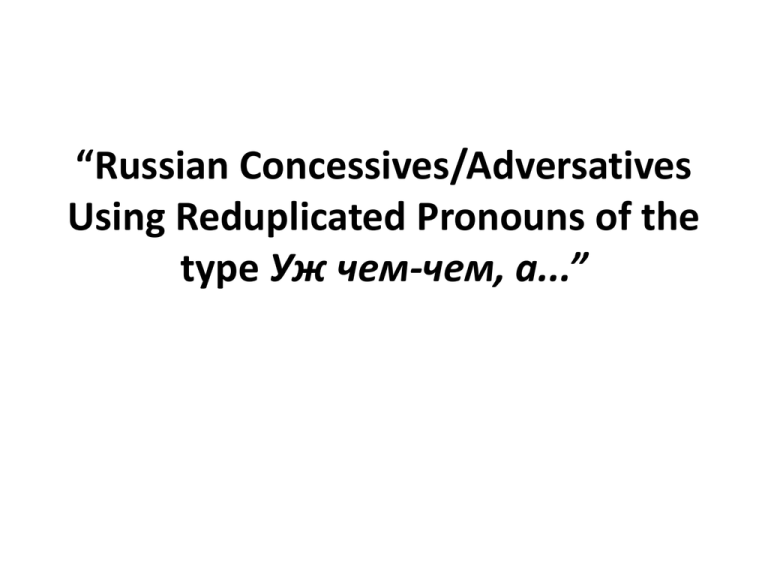
“Russian Concessives/Adversatives Using Reduplicated Pronouns of the type Уж чем-чем, а...” • My talk for today is about a type of Russian construction that never seems to be mentioned in any of the textbooks or grammars for foreigners that I have seen. • I first remember hearing it around 35 years ago, as spoken by a Russian native speaker. • I had to do some digging and ask questions to understand it, which was before the internet. • I recently noticed an internet forum where some English-speaking students of Russian were confused by this construction and needed help from native speakers to understand it. (See http://forum.wordreference.com/threads/чемчем.226733/). This led me to think about this topic in some more detail. • This Russian construction consist of two main parts. • The first part of the construction often, but not always, begins with the word Уж, followed by a reduplicated interrogative pronominal form (что-что, где-где, сколько-сколько, etc.). Single or reduplicated prepositions can also occur with the pronoun. • The second part of the construction usually begins with the contrastive word а, followed by non-reduplicated, non-interrogative form. The second part also commonly includes a word that states sureness on the part of the speaker, such as точно. In the case of the interrogative чем, this means that the phrase would commonly give us examples like this: • Уж чем-чем, а проблемами ее не испугать. • (You might be able to frighten her with something, but not with problems.) • When prepositions occur, we can either get a reduplication of the whole prepositional phrase, or just of the pronoun (i.e. either у кого у кого, or у кого-кого), although Es’kova (2011, Избранные работы по русистике, p.440) claims that the Russian literary standard requires the reduplication of the entire prepositional phrase (“опущение второго предлога не соответствует норме”. Es’kova’s paper only covers the topic of punctuation in such phrases. • Thus, the 3 main types, based on prepositions, are as follows: • Type A. Reduplicated pronoun with no prepositions. • Уж чем-чем, а проблемами ее не испугать. • Type B. Reduplication of the whole prepositional phrase. • Уж у кого у кого, а у нашего следующего фотографа, опыта в работе хоть куда! • (I don’t know about other people, but our next photographer has excellent work experience.) • Type C. Non-reduplicated preposition plus reduplicated pronoun (perhaps non-standard, though colloquial): • А уж у кого-кого, а у нее-то выбор был! • (I don’t know about anyone else, but she had a choice.) • Handbooks for native speakers often emphasize the punctuation rules about where hyphens or spaces should be used, without getting into the questions of meaning. • Reduplicative intensification (Чего-чего?) is treated together with the concessive Уж чего-чего, а... type. • Cf. Lopatin Слитно, раздельно, или через дефис? (2012): • Rules about having no punctuation between repeated prepositional phrases also treat both types together. • Intensifiers (На что на что они только не уповали!) are treated together with reduplicated concessives (Уж с кем с кем, а с ним этого не должно было случиться.) • I have found very few treatments of this topic. A paragraph is devoted to it in volume 2 (Синтаксис) of the Russian Academy Grammar of 1980 (written by Natalija Švedova). • The general topic is “subjective-modal” meanings, using units that are joined without conjunctions. In this case, the reduplicated pronouns are joined without an intervening conjunction: что-что, кого-кого, чем-чем, etc. • Švedova defines the general meaning and goes on to interpret what two examples really mean. • The summary of the meaning is as follows: • Такие сочетания обозначают допущение иного — не называемого и неопределенно мыслимого субъекта, объекта, обстоятельства, признака, противоположного тому, о котором сообщается во второй части конструкции. • In other words, the reduplicative part presents an unnamed and indefinite concept which is diametrically opposed to the statement in the second part of the construction. • Parallel versions of two examples are given—the construction followed by a paraphrase: • Švedova suggests that the word “perhaps,” or “может быть” covers the meaning of the first part. I would suggest that it may be close to “I don’t know if…” In other words, the speaker can’t vouch for all of the instances of what, where, or who is involved, but the speaker does know for sure about what is stated in the second part of the construction. This increases the veracity of the statement, which is also often accompanied by words which emphasize the sureness of the second part (e.g. точно). • One might suggest that there is a strong element of evidentiality going on here. The speaker has no direct knowledge or evidence about the first statement, which is reduplicated to show that point. Maybe it’s true, according to Švedova’s interpretation, but the speaker does not know for sure. However, the second part is vouched for as if witnessed. • Thus, the contrastive, or concessive meaning recognized is the gulf between the complete universe of “what,” “who,” “where,” etc., and the specific statement of an object, person, or location which is a small subset of the full set. • If we take “Кто-кто, а он-то придёт,” as our example, the words кто-кто refer to the entire set of possible persons, about which it is assumed that no definite information can be possessed. This is then contrasted to a tiny subset of all possible persons, namely “он” (he). This is emphasized and set off by the particle “–то,” and this person’s arrival is known. • The productivity of this construction lies in the fact that any narrow statement can be expanded to include all possible instances. To emphasize how much one knows about the narrow case, one states a lack of knowledge about the wider case. This suggests similarity to the English expression, “All I know is…” (or, dialectally, “All’s I know is…”), increasing veracity by narrowing the scope of the statement. • The concessive meaning lies in the fact that the speaker concedes a lack of knowledge about all relevant instances of the situation, contrasted to a full knowledge about a specific case. • The Academy Grammar considers this an “adversative” (противительный) type of construction, due to the opposing statements of not knowing and knowing for sure about something. • I would like to survey some of the data and outline the basic categories involved. The first part of the construction is an interrogative pronoun, which can be classified in terms of its inflectional or adverbial properties, as follows: • I. Interrogative pronominal substantives (вопросительные местоимённые существительные): что-что, кто-кто in all their case forms (чего-чего, чему-чему, чем-чем, когокого, кому-кому, кем-кем, etc.), plus their use in prepositional phrases, with a variety of prepositions (e.g. о чём о чём, у кого у кого, etc.). Either with reduplication of preposition plus pronoun, or reduplication only of pronoun. • II. Interrogative pronominal adjectives (вопросительные местоимённые прилагательные): какой, который, каков; possessive чей, declined for case, number, and gender. • III. Interrogative pronominal numeral (вопросительное местоимённое числительное): сколько, declined for case. • IV. Interrogative pronominal adverbs (вопросительные местоимённые наречия): как, где, куда, откуда, когда, отчего, зачем, почему. • The first two categories, being inflected, can occur with or without a preposition. Therefore, as previously stated, they can be further subdivided, based on use with and without a preposition, and whether the preposition gets reduplicated, along with the pronoun. • The first group of examples involves the inflected type of pronoun, which can be used with prepositions. • Before looking at the inflected examples in more detail, let’s see whether the automatic online translation services are programmed properly and can deal with the Russian sentences of this type that we have already looked at. • Five sentences were submitted to Google and Yandex and also translated by me, for comparison. Russian Examples (with my translations): 1. Кто-кто, а он-то придёт. (Maybe someone else won’t come, but he’ll come.) Google Online Translations: Yandex Online Translations: 1. Someone who, but it is something coming. 1. Who-who, and he will come. 2. Что-что, а уж одеться я умею. (Maybe I don’t know something else, but I know how to dress.) 2. What's that, and so I know how to dress. 2. What's that, and I know how to dress. 3. Уж чего-чего, а работы хватает. (I don’t know about anything else, but there’s sure enough work.) 3. I do all sorts of things, and enough work. 3. Oh, and missing work. 4. А уж у кого-кого, а у неё-то выбор был! (Maybe someone else didn’t have one, but she sure had a choice.) 4. And as someone who, as she had 4. And so anyone else, and she was a choice! chosen! 5. Уж чем-чем, а проблемами её не испугать. (Maybe you can scare her with something, but you can’t scare her with problems.) 5. Oh, what-what, and the problems do not scare her. 5. If problems and not to frighten her. • Having see that the online translation systems seem to be totally unaware of this construction, let us proceed with our survey of the types that occur in Russian, starting with the inflected type of substantival interrogative pronoun, in its reduplicated form. Pronoun A. Without preposition что NA что-что G чего-чего B. With reduplicated preposition до чего до чего от чего от чего у чего у чего L (*чём-чём) о чём о чём D чему-чему к чему к чему I чем-чем с чем с чем C. With nonreduplicated preposition до чего-чего от чего-чего у чего-чего о чём-чём к чему-чему с чем-чем • The first examples are of the pronoun что, without prepositions, in various cases (this is Type A in the table): • Уж что-что, а обыск местности они проводят на пять баллов. • Уж чего-чего, а работы хватает. • Уж чего-чего, а вот соскучиться — ну, никак не получится. • Чему-чему, а дисциплине я его научу! • Чему-чему, а этому не бывать! • Ну пусть идёт вагоны разгружать, чем-чем, а здоровьем его бог не обидел! • Уж чем-чем, а бычком пренебрегать не следует. • Чем-чем, а комплексом неполноценности не страдаю. • In each case, the first part comes close to meaning either “Maybe” or “I don’t know about all such cases.” • The next examples are of the animate кто, in various case forms: • Уж кто-кто, а Гнеточкин в такой час сюда не сунется. (“Дом свиданий,” Леонид Юзефович) • Уж кого-кого, а тебя не забыть. • Даже если бы шли угрозы, уж кого-кого, а отца Кабанова я не боюсь. • Вот уж кому-кому, а Алексею мужества не занимать. Он очень красиво держится. • Уж кем-кем, а идиотом он не был это точно. • Уж кем-кем, а им она довольна. • • • • • • • • • • • Type B refers to reduplicated pronouns which are part of prepositional phrases, where the entire phrase is repeated. Examples for что: Я всю дорогу говорила, уж до чего до чего, а уж до Сибири-то он точно не доедет. Уж от чего, от чего, а от них мы не устаем никогда! Уж у чего у чего а у спирали побочек до фига. (I don’t know what anything else has, but an IUD has a hell of a lot of side effects.) Уж о чем, о чем, а о ГУЛАГе дети и так слышат "из каждого утюга", а вот о запоротых на конюшне - точно нигде. (Comma instead of space.) (Who knows what else they hear about, but kids hear about the GULAG from everywhere as it is, but never a word about floggings in the barn.) Уж в чём в чём, а в этом он разбирается. Уж на чём-на чём, а на этом не будем экономить. (Wrong use of hyphen—should be a space.) Уж к чему, к чему, а к этому он привык с детства. (Wrong use of comma—should be a space.) «Да уж, – иронично усмехнулась про себя Лариса. – Уж с чем, с чем, а с мужем мне точно повезло!» • • • • • • • • • • • • • Examples with forms of кто: Вот уж от кого, от кого, а от них не ожидали. Анна, у кого у кого, а у меня нет сомнений на их счет. (Original author attempted to place a hyphen between the two instances of у кого.) Уж в ком, в ком, а в нём можете не сомневаться. Вот уж о ком о ком, а о нем беспокоиться нечего. На ком на ком, а на себе эти люди не экономили. И хотя уж на ком на ком, а на Брайанте возраст отражается не так заметно, как на остальных, но всё же его влияние на игру Мамбы присутствует. (Regardless of what other influence it may have had, age has not affected (Coby) Bryant so obviously as others, although it has influenced “Mamba’s” playing.) Уж к кому, к кому, а к ней мы точно никакого предубеждения не питали! Уж с кем с кем, а с ним этого не должно было случиться. Уж перед кем перед кем, а перед финами мы действительно виноваты за 1939 год. (Maybe not against others, but we were guilty of the 1939 action against the Finns.) • In type C, the preposition is not repeated, but the pronoun is. Cf. these examples with forms of что: • Вот уж от чего-чего, а от жизни я не устала. • И, знаете, уж до чего-чего, а до этого собаки бы точно додумались! • Уж в чём-чём, а в детях он точно никогда не нуждался! (Татьяна Тронина, Дворец для сероглазого принца) • К чему только ни были привычны жители Великого Города, избалованные столицей, в чём-чём могли сомневаться ― но только не в богоизбранности пифий. (Елена Хаецкая, Синие стрекозы Вавилона) • Уж к чему-чему, а к такому вопросу Хутчиш был не готов. • Да уж. К чему-чему, а к моему второму сюрпризу атакующие были точно не готовы. • Уж с чем-чем, а с идеями у нее всегда было все в порядке. • Уж перед чем-чем, а перед тонконогими стаканами я испытываю особенный трепет. • Examples with forms of кто: • Уж от кого-кого, а от Люды я помощи никак не ожидала. • И уж у кого-кого, а у Путина есть все возможности этим воспользоваться. Вызвать лучших врачей. • Вот уж у кого-кого, а у меня денег нет. • Уж в ком-ком, а в ней я уверена. • Фамилия сексуального маньяка. Нет, уж к кому-кому, а к нему я ни ногой! • Уж к кому-кому, а к Вере Аркадиевне мы больше в гости не пойдём. • Но уж с кем-кем, а с эскулапами у меня, увы, ну очень большой опыт общения. • Большинство из нас почти уверено в том, что уж с кем-кем, а с ним ничего плохого произойти не может по определению. • Не всякий человек, понятно, но уж перед кем-кем, а перед самим собой в данном вопросе я старался быть честным. (Алексей Евтушенко, Пока земля спит) • Уж перед кем-кем, а перед Ниной Георгиевной Катя чувствовала особенную вину. • In the case of pronominal adjectives, there are many examples for the various inflected forms of какой and чей. However, I could not find any for который, каков, perhaps due to the non-colloquial nature of these words. • Forms of какой without prepositions: • Уж какая-какая, а эта смерть разведчикам не грозила. • (Maybe it was different with something else, but this kind of death was not a threat to spies.) • Так, теперь надо быстренько звякнуть Магде и убедить ее, что вовсе она не скучная, а работу мою уж какой-какой, а значительной точно не назовешь. • (OK, now we have to give Magda a quick ring and convince her that she’s not boring at all, and that you can call my work whatever you want, but not significant.) • Вот уж какой-какой, а этой проблемы в России не было, нет, и не будет! — рассмеялась она. • (Whatever other problem might exist, this problem has not existed, does not exist, and will not exist in Russia!—she burst out laughing.) • Вот уж какого-какого, а такого предложения я никак не ожидал. • Уж какому-какому, а этому кораблю шторм не страшен. • Ветала лукавил, ибо уж каким-каким, а обычным назвать его было нельзя ни в коем случае, и более того, за своё существование он убеждался скорее в обратном. • Уж какие-какие, а амвеевские витамины прошли все мыслимые и немыслимые проверки в России и обладают всеми необходимыми сертификатами и разрешениями. • Forms of чей without prepositions: • Уж чей-чей, а ее звонок телефонистки узла связи прослушают с особым вниманием. • (Maybe they won’t do this to someone else’s call, but the telephone operators will listen to hers with special attention.”) • То была действительно шутка, ибо уж чья-чья, а судьба Александра Николаевича представлялась всем ясной, как вершины Альп. • И уж чьему-чьему, а его мнению довериться можно. • Уж чьи-чьи, а твои советы мне не надо. • Уж чьих-чьих, а твоих коментариев тут всегда хватает! • Уж чьими-чьими, а твоими советами я бы никогда не пренебрегала! • Какой with reduplicated prepositions: • Вот у какого, у какого, а вот у меня точно все получится. (Wrong use of comma.) • Вот от какого, от какого, а от тебя я не ожидал! • (Note that “не ожидал” often occurs in the second part of these constructions, meaning that the action from someone else—in the first part—is expected, but not the narrow case in the second part.) • Чей with reduplicated prepositions: • Уж к чьему к чьему , а к твоему совету можно прислушаться. • Какой with non-reduplicated preposition: • Вот уж от какого-какого, а от этого праздника я не ожидала совсем ТАКОГО КОЛИЧЕСТВА эмоций и чувств, правда. • Но в любом случае идея такая есть, и уж с какой-какой, а с социальной точки зрения она точно не сродни залам игровых автоматов. • Странно. Уж на какой-какой, а на этой клавиатуре у меня все всегда срабатывает безотказно. • Чей with non-reduplicated preposition: • Игорь, уж к чьему-чьему..., а к твоему опыту мы относимся серьёзно!! • Уж с чьими-чьими, а с автоматами и играми данной компании я знаком очень хорошо. • The numeral pronoun сколько can occur in this construction, but I have not been able to find it with prepositions. Examples: • Или для всех участие платное, или для всех же бесплатное. Уж сколько-сколько, а 100 тысяч у всех к концу сезона наберется… Думаю, что взнос должен быть обязательным для ВСЕХ участников конкурса! • (Either everyone pays or everyone gets in free. However it much it might be, everyone will have 100,000 by the end of the season. I think a fee should be obligatory for ALL contest participants.) • УЖ СКОЛЬКО-сколько, а пятидесяти этому артисту ну никак не дашь! • Whatever age he is, there’s no way you’re going to think this artist is 50! • Next, we look at the non-inflected interrogatives где, куда, откуда, как, and когда: • где-где • Где-где, а на Кубани его знали очень даже хорошо. • Где-где, а в этом доме всегда весело. • куда-куда • Куда-куда, а в Москву он не откажется поехать. • Куда-куда, а в политику Иван Поддубный не лез. • Уж куда-куда, а на Урал эти семена и саженцы никто даром не повезёт, а покупать их – риск большой. • откуда-откуда • Коробка передач. Уж откуда-откуда, а со стороны этого узла я подставы не ждал. • (The transmission. This was the last place I was expecting to have trouble.) • Уж откуда-откуда, а из спорта никотин надо изгонять самым энергичным образом. • • • • • • • • • • • как-как Уж как-как, а так меня еще никогда не называли! (Whatever they called me, they never called me that.) Уж как-как, а знаком благодарности эту "щедрость" называть крайне неразумно. (Call it what you want, but it would be very unwise the call this “generosity” a sign of gratitude.) когда-когда Уж когда-когда, а сегодня Снежанна постаралась выглядеть сногсшибательно. Of all times, Snezhanna tried to look spectacular today. Вот уж когда-когда, а сегодня ему стоило остаться в Грозном. (Of all days, today he should have stayed in Grozny.) Уж когда-когда, а сегодня мы это заслужили. • In the case of the interrogatives почему, отчего, зачем, the examples I found really were based on prepositions with что, rather than these words in the meaning ‘why?’, ‘what for?’. The authors were often confused about the punctuation and tended to write Уж отчего-отчего, а от этого..., instead of Уж от чего от чего, а от этого... • почему-почему • What is often written as почему-почему, is often really по чему по чему: • Уж почему-почему, а по буйству цветов мои работы всегда можно узнать. • (Rather than anything else, my work can always be recognized by the riot of colors.) • зачем-зачем • Similar to the situation with зачем-зачем and отчего-отчего, e.g. • Зачем-зачем, а за ценой мы не постоим. • (We may do whatever, but won’t be stingy about it.) • отчего-отчего • Вот уж отчего-отчего, а от моего задымления вы в абсолютной свободе, курить с вами даже на одном поле не стану. • Whatever else, you are in complete freedom from my smoking up the place and I won’t even smoke on the same field you’re on. • That ends our summary of concessive-contrastive constructions with reduplicated interrogative pronouns! • Thank you for your attention!
